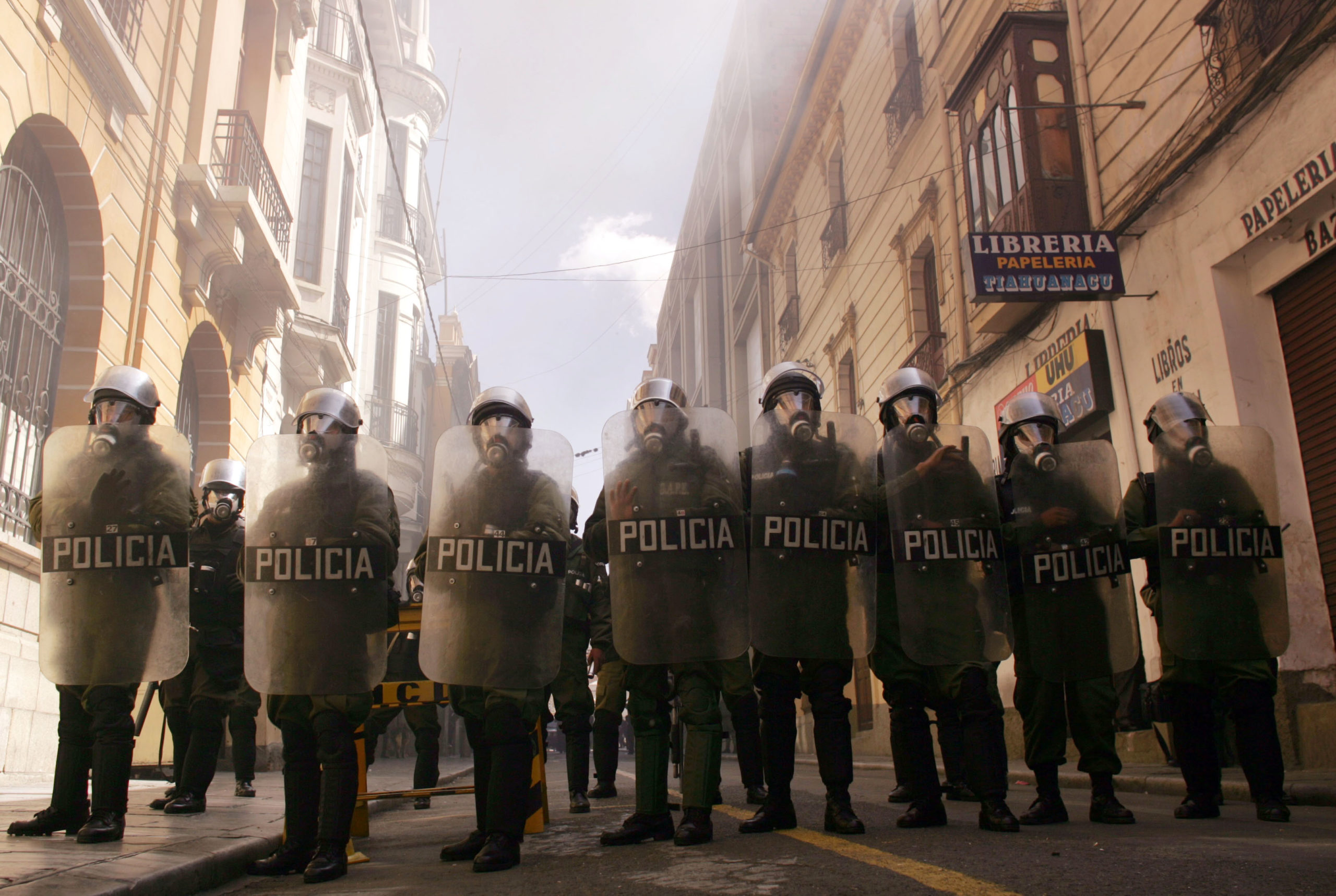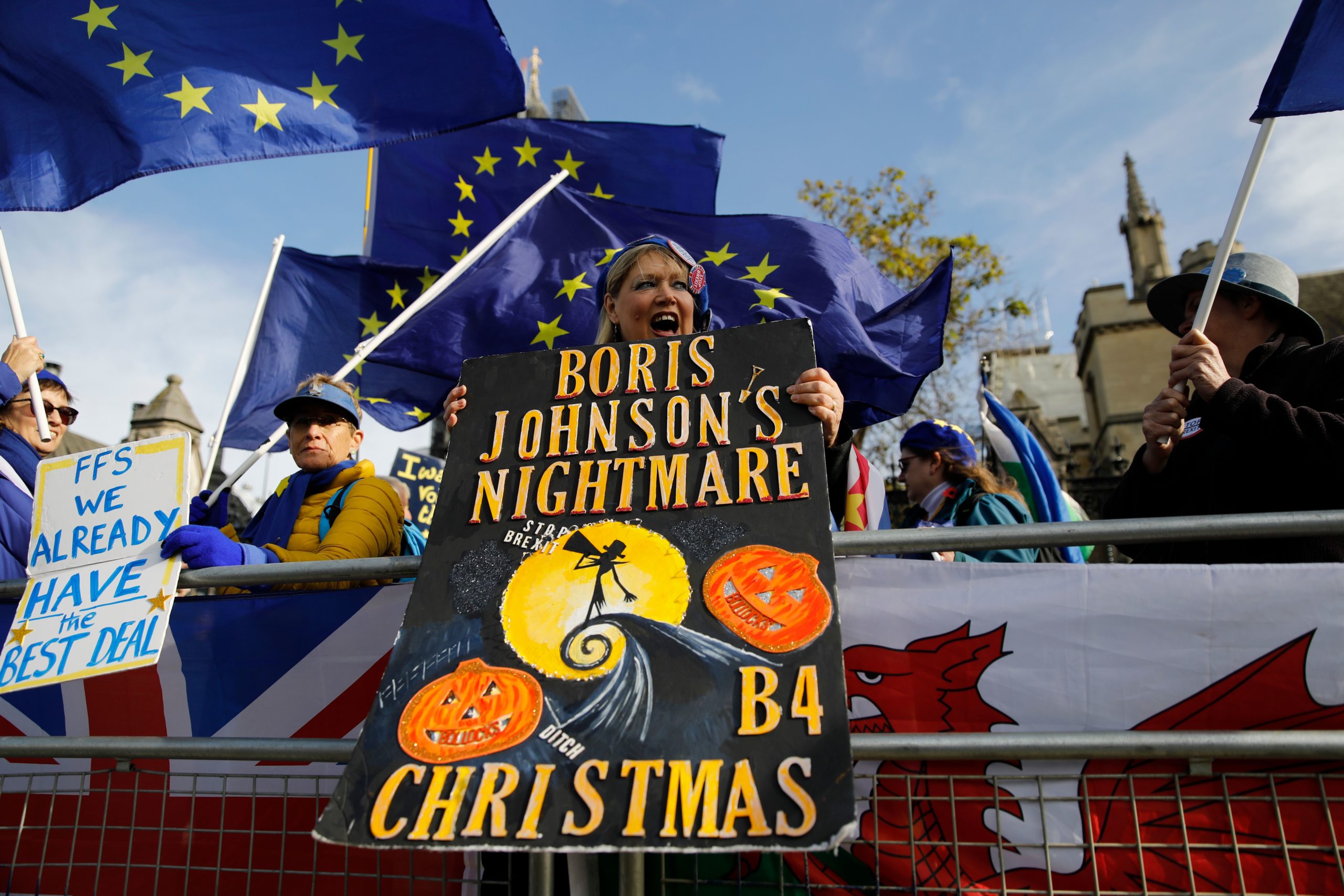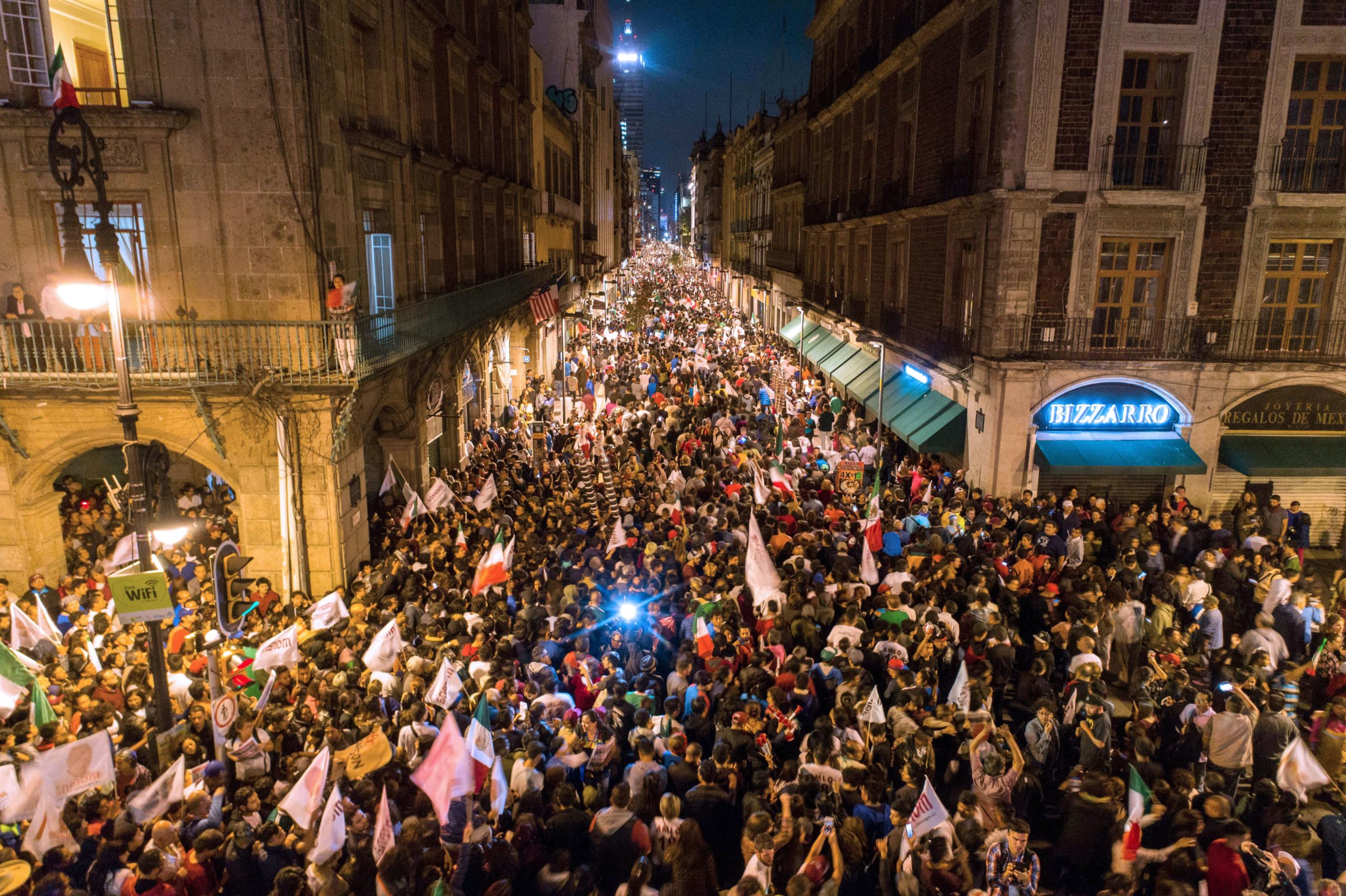Chileans demonstrate against social inequality.
COMMENT
Last year was not a great year for South Africa. In fact, the past decade was pretty terrible. But, unlike many countries, our democracy is not under threat, even if our economy is.
It often feels like there is a crisis at every level of society in South Africa, as if the government is unable to govern and we are cut loose, adrift in the current. We have a ruling party that in many ways is unable to rule, hamstrung by its internal conflicts, tied to a party unity that prevents it from performing adequately.
Crisis of representation
Around the world, established and fragile democracies are experiencing a crisis of representation; a rupture in the link between representatives and those who seek to represent them. An immediate feature of process is a crisis of support for traditional parties — think of the former mining areas in Northern England that went to war with Margaret Thatcher in the 1980s but voted Tory in December’s election.
Bolivia just had a military coup, sectarian authoritarian rule is being consolidated in India, mass protest has rendered Chile ungovernable and threatens France. It seems as if the world is in flux.

Mixed bag: Bolivian police stand guard after protests in 2005. Evo Morales became president in 2006 but in 2019 fled to Argentina after protests and pressure from the security forces. (Spencer Platt/Getty Images)
The second feature is the extension of this crisis to civil society. Who, in South Africa, can really speak convincingly for the majority of the poor? Not social movements. How many strong and organised social movements truly exist in the country? The most organised force in South Africa is the evangelicals, who can hardly be considered friends of constitutional democracy. The nongovernmental organisations are answerable more to donors than any constituency. The unions, beset by political squabbling, corruption and deindustrialisation, have failed to provide the leadership for the working class.
Crisis of representation
Cyril Ramaphosa was elected president of the ANC on a platform of promising to fundamentally repair the state; to get government to govern again. This project — at least so far — is disappointing. Ramaphosa moves from crisis to crisis.
Each of these crises seems to emanate from the internal conflict in a ruling party that values false unity over the fortunes of the country. South Africans are left hoping for resolution and unable to meaningfully have a say over the future of the country, which is dependent on triumph over those seeking to retain the power and patronage of the Zuma years.
This crisis of representation extends beyond the ruling party to the mangled and masochistic opposition. The Democratic Alliance has chosen fratricide over governance, too. It has lost control of its Gauteng metros, because it sought to deal with its poor electoral results through a return to ideological purity.
The Economic Freedom Fighters — a party that claims the mantle of socialism — is more concerned with keeping its leaders out of the clutches of the National Prosecuting Authority. It invokes the revolution to mobilise its members in defence of the stolen funds from the VBS Mutual bank — looted from pensioners — that are needed to maintain its leaders’ lifestyles.
Wrong economic model
At the core of this crisis of representation is an economic model that is not working. It cannot sustain the rate of growth needed to provide the jobs and resources required to deal with structural poverty and unemployment. The unemployment rate close to 40% and none of the political parties offer a credible path of out this mess.
Our economic model is broken. Neoliberalism cannot generate the level of growth required to ward off mass social unrest. Empty anticorruption rhetoric and appeals to good governance will not reduce unemployment and halt the bloodbath in the manufacturing sector.
The fact is that, even if Ramaphosa was able to magically fix the state-owned enterprises and reduce corruption, we would still be screwed. Our unemployment levels are simply that staggering. The truth is that the economic model renders a significant part of the population surplus. In this environment, criminality, disorder and hopelessness blossom, providing fertile conditions for snake oil salesmen of both the religious and political varieties.
The centre and the right can only offer bromides about reforms to appease capital, the same reforms and austerity measures that have proven, from Argentina to Greece, to hurt the most vulnerable and negatively affect the economy. Although the EFF is not always wrong — particularly about the dangers of capital flight — simply repeating slogans about nationalisation and expropriation without compensation does not translate into a credible programme. The EFF has no real ideas about how to get us out of this crisis, and it is no surprise that parties alternate between open civil war and empty demagoguery.
This is apparent outside of South Africa too. Centre-right governments around the world seem unable to govern, and are either beset by continuous mass unrest, as in Chile and France, or economic meltdown, best demonstrated by the fate of Mauricio Macri in Argentina, who has been replaced by a centre-left leader, Alberto Fernandez. They are unable to commit to social investment and only to more reforms. In this environment, the parties of the centre-right are either becoming more radical, as can be seen with United States President Donald Trump or the United Kingdom’s prime minister, Boris Johnson, or are rendered electorally irrelevant by the rise of an authoritarian far-right.

Britain’s Prime Minister Boris Johnson (below) has a majority in Parliament and will ram through his Brexit deal. (Tolga Akmen/AFP/Getty Images)
For many, the collapse of the political centre can only explained through the primordial rise of irrational passions such as nationalism, religious fundamentalism, xenophobia and racism lumped together under the unwieldy category of populism. The liberal consensus of the post-Cold War era has collapsed, the centre has fallen and the last centrists are left bleating out tired retro 1990s slogans — Oasis fans who can’t understand the popularity of Lil Nas X.
The international left
The centre-left has also been rocked by this global problem. As parties moved to the centre during the 1990s they soon became mostly indistinguishable from the centre-right, betting on the fragile loyalties of middle-class voters rather than their traditional working-class base, who they abandoned to the market.
Their base, devastated by deindustrialisation and the gutting of social services, faces a future of unemployment and precarity.
Once-mighty parties, such as France’s Socialist Party, have sunk and others, like Germany’s Social Democratic Party, remain in steady decline. The parties that have resisted this process have done so by aligning with the radical left, such as the Portuguese and Spanish socialist parties, to prop up anti-austerity governments.
In Latin America, something a little different happened. The parties of the left, which had presided over one of the greatest periods of redistribution in the region’s history in the past decade, were hit hard by the fall in commodity prices and the return of a revitalised right, helped on by Washington.
But they remain electable. In Argentina the centre-left recently returned to power, Andrés Manuel López Obrador won a majority in Mexico. In Brazil the Workers’ Party would have almost certainly won if not for the imprisonment of Lula (Luiz Inácio Lula da Silva) for alleged corruption.

Shadows: The successes of Mexico’s leftist president, Andrés Manuel López Obrador, were undermined by drug violence that claimed 53 000 lives in 2019. (Mario Vazquez)
In Bolivia Evo Morales was removed in a coup after an election that nobody disputes he won; the argument for electoral fraud hinges on his margin of victory.
For years, it has been asserted as self-evidence that democracy and change would come from the streets, from protest and spontaneous movements of people. Organisation, electoral politics and structure were the antithesis of creative politics but, rather surprisingly, it turned out that the return to left politics in the Global North would come through electoral politics.
New electoral forces rose in response to austerity and disillusionment with traditional parties on the left, too, such as Podemos in Spain and in parties of the centre-left in the form of the insurgent candidacies of Bernie Sanders in the US and Jeremy Corbyn in the UK.
In the race for the American Democratic Party’s candidacy, once taboo ideas such as free universal healthcare and the Green New Deal, which aims to address climate change and economic inequality, are now in the mainstream of the public imagination through the candidacy of Sanders, who still stands a decent chance of winning. His rivals have adopted many of his policies without being able to convince the public that they are as committed to delivering them.
Although Corbynism ultimately fell victim to Brexit — a problem the divided party was unable to provide an answer to — its radical policies such as free broadband for all, the renationalisation of the rail services and changing the ownership structure of the economy are still popular. These policies continue to enjoy majority approval. Indeed, Labour’s move to the left forced the Tories to end austerity and promise public investment.
The major achievement of these new movements so far has not been electoral power, but to move politics to the left. Ideas and policies of redistribution, universal healthcare, socialism and a critique of capitalism are again mainstream in the Global North.
It feels like the intellectual energy is emanating from the left. Creative policy thinking is its domain, the centre can only offer nostalgic fantasies to return to the good old days of the 1990s and the right doubles downs on culture war. It is no longer forbidden to talk about capitalism and this itself marks a big political shift.
So what about SA?
South Africa is in the curious position of public debate resounding with radical slogans, but without a truly socialist movement. It is clear that the EFF does not offer a solution for South African workers: its cultish tendencies, chauvinism and fondness for appropriating funds from the poor to fund the revolutionary fashion of its leaders is not a good foundation to build socialism on.
A new left force from the trade union movement has not emerged. In last year’s elections, the Socialist Revolutionary Workers’ Party (SRWP) got less than 25 000 votes or 0.14% of the vote. For a party spearheaded by metalworkers’ union Numsa, which has nearly 400 000 members, this was an abject failure. Simply put, the party could not convince Numsa members to vote for it This was made even worse by its leaders, who, instead of taking responsibility for a disastrous campaign that cost a significant amount of money, blamed their results on electoral fraud. The South African left has often fallen victim to a fear of asserting its ideas confidently among workers, preferring to win influence among union leaders, who tend to, at the first sign of criticism, blacklist left intellectuals.
There are a number of lessons to be drawn from this. First, there is no mass base waiting for a socialist party to vote for. A base must be constructed and trust must be won. This was made by the failures of previous union soirees into politics — most notably the Zunami that swept Jacob to power.
There was also the problem of the SRWP’s manifesto — released mere days before the election — that spoke more to the German Democratic Republic of the 1960s than to the South Africa of 2019. The revolutionary lexicon inherited from the liberation movements seems more like a mask for an increasingly bankrupt political class than a programme to build the future.
Prospects for a new left
The task for a new left is twofold. First, it needs to perform the hard intellectual labour of crafting a credible vision for South Africa’s future. The left doesn’t have all the answers at hand, but it can draw inspiration from other places. In Europe and the US, there is a new vibrant left that has all the intellectual energy and ideas, with growing infrastructure and new organisations. In Latin America, there is more than a decade of left governments to study and to learn from their successes and failures.
Second, there is the harder task of constructing a new organisation to take this vision to the masses and build support for a new political project.
The trade union movement needs to be revitalised and new forms of organising are required in precarious sectors and to deal with the land question, urban and rural.
Although any left political project requires a cross-class alliance, what is needed is a project that truly speaks for the working class, that is grounded among the people and that gives voice to the struggles against rural despots, greedy bosses and corrupt local government.
A new left must strive to deepen and extend social citizenship, not only taking up continuing issues of racial inequality but class too. Too many working-class South Africans have no meaningful representation and millions live under the rule of tyrants, rather than the Constitution, in rural areas.
If the next 10 years are spent hostage to the fortunes of internal power struggles in the ANC, who knows where things will end up. There are no easy successes, but if the left can start with modest ambitions, it can perhaps achieve something in the next decade.
Any new socialist project has to start from the premise that 1994 was a victory for workers (albeit not a revolution) and not a betrayal. The demagogues of the EFF cannot monopolise the language of social change and redistribution.
I spoke to Ben Turok — anti-apartheid veteran, contributor to the Freedom Charter, economic theorist, author, and parliamentarian — a few months before he died. Turok, even in his 90s, was energetic, brave, witty and analytically clear to the end.
His parting lesson was that, however bad things are right now, we should remember that we are not facing imminent arrest and possible torture by an apartheid state, so we should quit whining and do the work.
Benjamin Fogel is a PhD candidate in Latin American history at New York University and is a contributing editor for Jacobin magazine and the website Africa is a Country